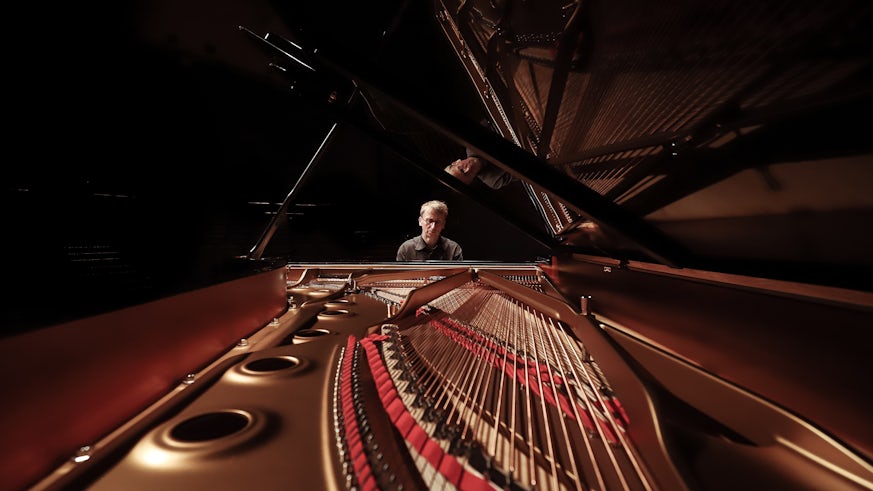My Life in Music by Professor Kenneth Hamilton
22 January 2020

Professor Kenneth Hamilton, Head of School, pays tribute to his parents on BBC Radio 3’s My Life in Music.
Exploring the idea that some music is too potent to bear because of the memories it evokes, Professor Hamilton shared how his mind was filled with John Dowland’s ‘Now, oh now I needs must part’ at his mother’s recent death.
The programme was the debut broadcast for Professor Hamilton’s recent recording of Dowland’s piece, arranged by Percy Grainger. The recording will be included on Professor Hamilton’s upcoming album, Romantic Piano Encores, released by Prima Facie records.
In the essay, he says: ‘Maybe the potency of all music, even of genuinely great music, derives at least some of its power, not just from the notes on the page, but from the sanctity of association. From the circumstances in which it was first heard, and from the memories it evokes ever after. In other words, it’s nostalgia in sound. A yearning for the past. Or, as the word itself means, a longing to return to some distant lost home.
‘Among 17th-century Swiss mercenary soldiers serving in foreign lands, the music of the Swiss alps summoned up such nostalgia that its public performance was banned, allegedly on pain on death lest it release a Pavlovian flood of desertions among the regiments.
‘I too have been banned from playing a piece of music for many years. And it’s this, Percy Granger’s wonderful arrangement of John Dowland’s ‘Now, oh now I needs must part’. The ban on my playing the piece luckily only extends to concert performances, not recording. More specifically, it only extends to concert performances where my wife is present because she can’t bear to listen to it.
‘As with the nostalgia of the Swiss soldiers, this is a ban by association. The reason that my wife can’t bear to hear this gloriously touching piece is entirely a personal one. I played it at her father’s funeral a number of years ago. He died all too soon and, for her, the piece is now indelibly overlaid with this association.
‘Some years later my own father died. I was in Germany at the time. When I heard the news I was on my way to a performance of Wagner’s ‘Twilight of the Gods’. The heavenly length of Wagner’s work gave me a good five hours to reflect on my father’s life and death. The infinitely uplifting ending did offer consolation, for our own lives carry on as the redemptive final chord dies away. My father would have wanted it that way. He was, himself, not much of a one for mourning.
‘My mother died very recently. She died with her favourite Gallic songs playing in the background by my own mind turned again to Dowland’s ‘Now, oh now I needs must part’. I reflected not just on her death, but on her life, which began in the first half of the 20th century – she was 90 when she died – and eddied well into the 21st.
‘Grainger himself enjoyed playing the piece nightly in his house in White Plains, New York just before he went to bed. With the repeat of the melody, the basic tune survives. But it is now not couched in 16th century chords. Instead, it is cushioned in modern harmonies. A musical time travel that elicits a host of remembrances. A personal journey of reflection. Perhaps a mirror of my mother’s life journey from the 20th to the 21st century.
‘And yes, it’s sad, but it also offers the bracing bitter sweetness of nostalgia. Of the positive and the painful together. It is a haunting, melancholic yet strangely uplifting music. For his part, Grainger ends with an addition to Dowland’s piece. A close of joyously reflective nostalgia. Praise of a life lived, and of a life that will carry on. Whether that of children or grandchildren.
‘It brings me consolation, not because it lets me relive a now unreachable past, but because it reminds me to be thankful for it by personally carrying on and fulfilling some small part of the future. That’s the music’s legacy and, ultimately, that of my parents too.’
Sir Nicholas Kenyon paid tribute to the broadcast in the Observer, describing the piece as a "touching contribution […] a personal story of loss and death that reaches out from the radio. This is what broadcasting is all about."
In response to many requests from listeners of the show, Prima Facie records have released an advance copy of ‘Now, o now, I needs must part’, available to download for free.
Share this story
The School provides a stimulating and supportive environment for musical scholarship, composition and performance.


